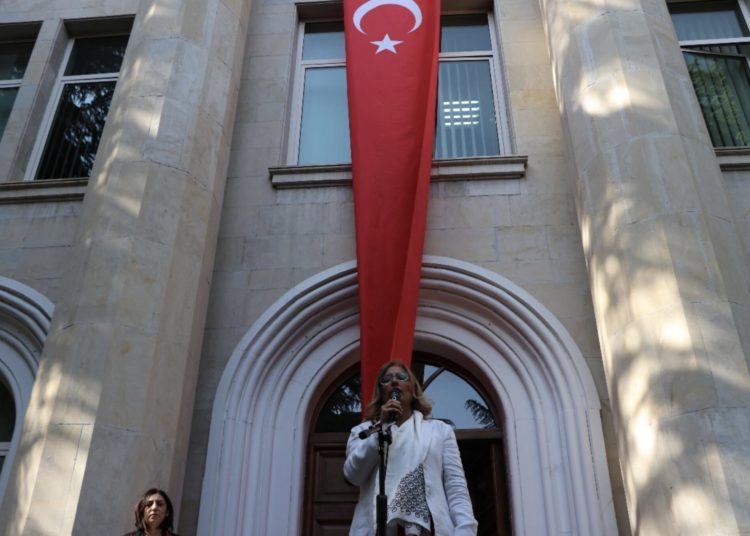Nordic Monitor
A Turkish police officer assigned as a counselor to the Turkish Embassy in the Georgian capital of Tbilisi has engaged in a large-scale spying campaign on critics, a secret Turkish government document revealed.
According to an official document obtained by Nordic Monitor, the counselor for Turkey’s Ministry of Interior at the Turkish Embassy in Tbilisi has collected information about a group that is vocally critical of Turkish President Recep Tayyip Erdoğan.
The document, dated April 10, 2019 and signed by Erdoğan Kartal, deputy chief of the counterterrorism department of the Turkish National Police, exposes clandestine spying activity in Georgian territory that targets critics as part of President Recep Tayyip Erdoğan’s long arm and campaign of intimidation to suppress dissenting voices even among diaspora groups. It also highlights the fact that officials assigned to embassies under the title of counselor and attaché for Interior Affairs have officially been instructed by the National Intelligence Organization (MIT) to conduct spying operations in Georgia and other countries.

According to the official correspondence, 52 Turkish nationals who had applied for political asylum in Georgia were profiled as members of a terrorist organization by Turkish diplomatic personnel. According to statistics, the number of asylum seekers from Turkey in Europe and neighboring countries has increased noticeably in recent years, especially after failed a coup attempt in 2016 during which the government started arresting tens of thousands of people including journalists, academics and human rights defenders on dubious charges.
Many Turks have been forced to flee their homeland because of the ongoing witch-hunt due to their links to the Gülen movement, a civic group led by US-based Turkish Muslim scholar Fethullah Gülen, who condemned the failed attempt and denied any role in it. Members of the Kurdish political movement have also faced a major crackdown, with a number of prominent Kurdish politicians jailed on terrorism charges.
With reference to the information received from the counselor for interior affairs in Tbilisi, Turkish asylum seekers are accused of having contact with local organizations affiliated with the Gülen movement. As seen in previous reports by Nordic Monitor, official correspondence confirms the systematic and extended spying on the part of Turkish diplomats to collect information on the activities of Erdoğan critics and local Georgian institutions. The document also exposes that Georgian organizations which were duly authorized and licensed under local law are described as terrorist entities by the Turkish diplomatic mission in clear contradiction with the perspective of Georgian authorities.

These intelligence notes on Turkish nationals listed by the Turkish Embassy in an Excel file were also circulated, according to a postscript in the document, to the counterterrorism units of police departments in numerous cities (Afyonkarahisar, Ağrı, Ankara, Antalya, Artvin, Batman, Burdur, Bursa, Corum, Edirne Elazığ, Isparta, Istanbul, Izmir Kırıkkale, Konya, Kütahya, Malatya, Manisa, Ordu, Rize, Samsun, Trabzon and Van) for further information.
This means that criminal investigations would be launched into these people in provinces where their birth registry records are located and their relatives live, exposing family member to legal action such as wrongful imprisonment and unlawful asset seizure on account of their profiled relatives.
The document and the list of names were also shared with the Interpol/Europol department of the Turkish police, which suggests that the Turkish government may initiate politically motivated extradition requests through Interpol against the critics who were profiled by interior ministry counselors. The Erdoğan government has been increasingly criticized for manipulating Interpol mechanisms to hunt down critics abroad. Interpol had even cut access to its database by the Turkish police for some time after the Erdoğan government tried to flood Interpol mechanisms by filing thousands of politically motivated cases that contravene the the Interpol constitution.

According to the document, government agencies were urged to keep the unlawful profiling documents secret and forward the list of names profiled and dispatched by the interior affairs counselor in Tbilisi to the relevant local public prosecutors, to be used in witch-hunt criminal cases. It is obvious that the Excel file fabricated in the Turkish Embassy triggered many criminal prosecutions on charges of terrorism. In Turkey, over half a million people affiliated with the Gülen movement have been put in detention facilities in the last two-and-a-half years alone on similar charges.
In accordance with a Cabinet decree published in the Official Gazette on February 25, 2018, the Ministry of Interior appointed new counselors to Turkish diplomatic missions in 71 countries, after which Uğur Köse, former head of the Traffic Research Center in Ankara, became the first interior affairs counselor in Georgia. The official mandate for these counselors including Köse is to coordinate law enforcement cooperation between Turkey and the host nations. However, the secret document reveals that the real mandate of these counselors is to spy on critics as in the case of Georgia, where Köse focused on targeting Erdoğan critics instead of contributing to the development of bilateral relations between Georgian and Turkish authorities.
Interestingly, Fatma Ceren Yazgan, the Turkish ambassador to Georgia and former deputy director general of the Foreign Ministry’s intelligence section, is believed to be one of the high-ranking bureaucrats behind the dismissal of Turkish diplomats. Yazgan is also known as the person who ran the profiling lists for Turkish diplomats who were later dismissed and/or jailed without any administrative or judicial investigation. None of the victims including top ambassadors who once served as advisors to prime ministers and presidents had a chance to challenge the fabricated charges before their dismissal.
On May 20, 2019, Turkish courts issued arrest warrants for 249 former Foreign Ministry personnel. Diplomats in detention have been subjected to torture and threatened with sodomy with batons while in police custody according to a report issued by the Ankara Bar Association.












